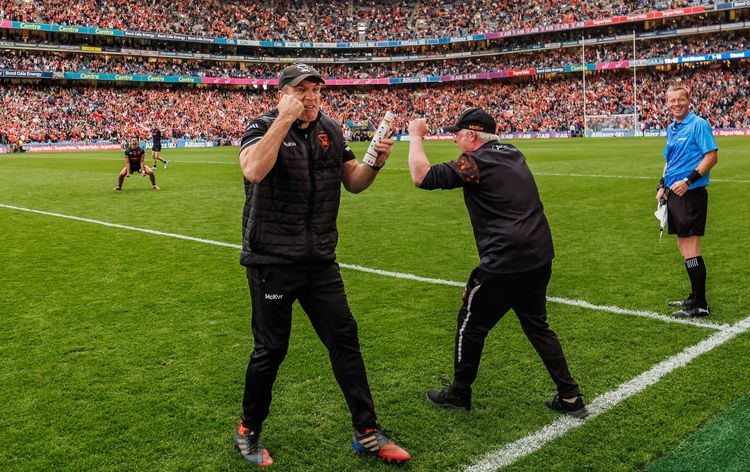Caitríona O’Leary spent years studying and singing the work on “Wexford Carols.”
By Colleen Taylor
I recently came across an album that combines some of my favorite things: Christmas and 18th-century Ireland. My own familiarity with 18th-century Irish culture is primarily literary, but now, thanks to the impressive research and musical acumen of an entirely unique Irish Christmas album called “Wexford Carols” (2015), I now have the sounds to supplement the words. For me, listening to “Wexford Carols” was like seeing the 18th century with new eyes, or rather, hearing with new ears, but for Caitríona O’Leary, the scholarly songstress behind the album’s achievement, these 17th and 18th century carols are old friends. Like a true Irish bard, O’Leary has spent decades studying and singing the songs on the album—and all that effort shines, chimes, and sings through.
First and foremost, the “Wexford Carols” is a work of cultural recovery. These are songs that have, quite literally, not been heard for centuries. O’Leary spent years in the archive seeking these lost tunes and, with both a musical ear and a scholarly mind, she has recorded them, honoring the original lyrics and melodies. This project was about more than scholarship though. O’Leary also felt an emotional pull to the music of this period, as she explained to me: “The people who first sang these carols were dispossessed and poverty-stricken. They came together in a very humble Mass-house or sometimes even just gathered around a Mass-rock in the corner of a field. But they did gather and took comfort in the promise of better times to come.” That image of the poor, rural Irish, suffering under tithes and cultural suppression, yet honoring a shared spirituality, reflects not only the backing image but also the ethos of O’Leary’s album. This collection is not just about the history of Christmas music, but more importantly, about making those silenced voices in Irish history audible again. “The Wexford Carols” has extracted hopeful sounds out of footnotes in old, dusty historical annals, has found joy amidst forgotten gravesites and lost legacies.
The actual recording of “The Wexford Carols” blended O’Leary’s historicizing impulse with her band’s more modernizing one. Two summers ago, a group of collaborators, including super-force folk singer Rhiannon Giddens and traditional music legend Dónal Lunny, as well as Rosanne Cash (Johnny’s daughter) and English folk singer Tom Jones, gathered in a barn in the Irish countryside—a fitting setting for recording centuries’ old Irish Christmas tunes. O’Leary recalls how the arrangement of the carols organically unfolded into a more democratic and collaborative process. She remembers, “I'd had ideas about how I wanted the carols to sound, but once everyone started bringing their own souls to the sound the carols unfolded in unexpected ways.” One “unexpected” force was undoubtedly American folk singer Rhiannon Giddens, who adds a soulful creole flare to the traditional whistles in a song like “Christmas Day Is Come.” Between Giddens and O’Leary, many of these old-time musical influences seem to meet each other in the middle of the Atlantic Ocean.
As O’Leary described it, the modern atmosphere in that barn at first seemed a “world apart” from the ways in which the carols were first conceived. “We recorded the album in the heat of July, arriving by airplane, train, car …. worlds apart from the original carollers! And yet, once I started singing the carols the images evoked by the beautiful poetry and tunes were vivid and very present.” Likewise, listening to these carols has a similar transformative and transporting effect. The past becomes more vivid and more present with each carol you hear.
When I asked O’Leary which carols were her favorites, she joked that she couldn’t possibly choose between her “babies.” But she did point to the “heart” in “Behould Three Kings,” the “groove” in “An Angel This Night,” and the “intimacy” of “Now to Conclude Our Christmas Mirth.” If not for the history, then you must at least listen to “The Wexford Carols” for its incredible, all-star transatlantic folk singer lineup. This group of creative minds and musical custodians is truly unprecedented in folk music.
“The Wexford Carols,” reminds us that, at the heart of it, there is no death in Christmas, or in Irish music for that matter. O’Leary said that working with this music and this history “reminded [her] of the importance of not despairing but of acknowledging, in the darkest time, that the light will shine again.” Christmas music has that special ability, as she puts it, to transcend time and circumstances, which is perhaps why we’re all so drawn to it. For O’Leary, the moral of her work in musical history is plain, simple, and wonderfully uplifting: “a good tune never dies!”
Find out more about Caitríona O’Leary and the album “The Wexford Carols” at http://www.caitrionaoleary.com
If you’re looking for fresh Irish Christmas music to diversify your playlists, check out the Whileaways new Holiday track, “Everyone,” a lovely, folksy Americana tune to balance out the jaunty carols. The song is a preview of the Whileaways’ third album, due for release in 2017. More info and listening at: whileawaysmusic.com.









